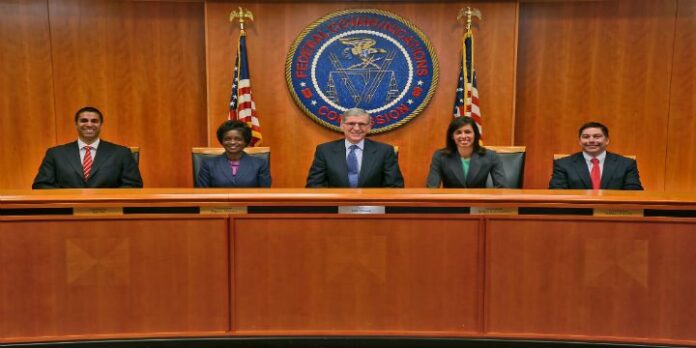FCC commissioners Pai and O’Rielly seek at least 30-day public review on net neutrality legislation
The Federal Communications Commission’s Republican members have asked that the government agency push back a vote on its Internet regulation plan in order to consider public input on the matter.
In a letter, commissioners Ajit Pai and Michael O’Rielly said the FCC should “immediately release” the 332-page document and “allow the American people a reasonable period of not less than 30 days to carefully study it. Then, after the commission reviews the specific input it receives from the American public and makes any modifications to the plan as appropriate, we could proceed to a final vote.”
Pai and O’Rielly claimed the move would show greater transparency on the matter, which has garnered considerable interest from Americans.
“Transparency is particularly important here because the plan in front of us right now is so drastically different than the proposal the FCC adopted and put out for public comment last May,” the letter noted.
The FCC last year initially opened up a public comment period on Internet regulation plans, which resulted in a record number of submissions that at one point brought down the its website.
FCC Chairman Tom Wheeler provided the document to the commission earlier this month with plans to conduct a vote on the matter on Feb. 26. Wheeler provided a “fact sheet” for public consumption that indicated the draft order would bring Internet access under Title II, which would allow the government agency to regulate services similar to a public utility. The move will include reclassifying services that consumers purchase from cable, phone and wireless providers similar to how the FCC regulates traditional telecommunications services.
The fact sheet prominently noted that Wheeler’s planned draft order will include language that the agency said will stand up to court challenges based on last year’s ruling by the U.S. Court of Appeals for the District of Columbia that said the FCC had failed to classify ISPs as “common carriers,” and thus outside of the agency’s regulatory jurisdiction. However, the court did leave open a case for the FCC to regain that jurisdiction if it reclassified ISPs under the Title II common carrier framework.
Wheeler last year seemed to hint that the FCC would go light in terms of regulating broadband networks following the appeals court decision, including reports that Wheeler had attempted to broker a decision that would please both broadband providers and public interest groups, but to no avail.
Wheeler’s position on the matter became more tenuous in November when President Barack Obama threw his support behind the FCC moving forward with bringing broadband access under Title II. Wheeler was nominated for his current position by Obama and was part of his initial transition team in 2008.
The move to bring wireless Internet access under the same guidelines could have a significant impact on current providers. While Wheeler has followed Obama’s lead in leaving in wording to allow for “reasonable network management,” the fact sheet states: “a provider can’t cite reasonable network management to justify reneging on its promise to supply a customer with ‘unlimited’ data.”
The FCC in 2010 released net neutrality rules that allow for “reasonable network management” from wireless carriers, noting that wireless networks are more easily impacted by network traffic than are wired Internet connections. That impact comes from the amount of wireless spectrum a carrier has to carry data traffic.
In bringing wireless Internet access under the provision, the fact sheet notes that 55% of current Internet access is carried over wireless networks.
“This proposal extends protection to consumers no matter how they access the Internet, whether they are on their desktop computer or their mobile devices,” the fact sheet states.
Most mobile operators have some form of network throttling linked to capped mobile data plans, which will likely not be impacted by the proposed order. However, customers who signed up for data plans advertised as “unlimited” could see those terms reinstated. The Federal Trade Commission, acting along with the FCC, last year filed a court complaint against AT&T Mobility over the mobile operator’s throttling of data speeds for “unlimited” data customers.
Wireless industry trade groups came out with comments suggesting concern over how the FCC plans to enforce the network management issue.
“We are concerned that the FCC’s proposed approach could jeopardize our world-leading mobile broadband market and result in significant uncertainty for years to come because the FCC lacks congressional authority to impose Title II public utility regulation on mobile broadband services,” said Meredith Baker, president and CEO at CTIA, which Wheeler formerly headed. “The mobile innovation and investment – $120 billion since 2010 alone – that American consumers rely on will be placed at risk by the FCC applying intrusive regulatory restrictions on mobile broadband for the first time. We continue to believe Congress’s bipartisan efforts to provide explicit authority to the FCC is the best path forward to preserve an open Internet and provide certainty for all stakeholders.”
“Regarding the chairman’s proposed net neutrality rules, we appreciate the commission’s recognition of the unique network challenges of competitive wireless carriers, yet remain concerned how the FCC will address the need for flexibility for network management,” noted Competitive Carriers Association President and CEO Steve Berry. “Despite this concern, we are glad to see the chairman’s proposal secures support for continued maintenance and expansion of mobile broadband and look forward to reviewing the details of the order.”
Bored? Why not follow me on Twitter

